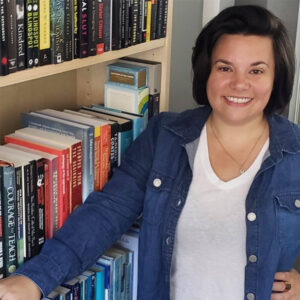
Colorado State University students, faculty and staff gathered earlier this month for the “Neuroaffirming Spaces for Staff and Student Success” conference at the Lory Student Center, kicking off with special guest speaker and researcher Victoria Verlezza, Ph.D.
Verlezza’s keynote address focused on creating what she calls, “neuroinclusive learning spaces.” Verlezza, who also identifies as neurodivergent, shared related personal stories and impacts from her day-to-day life, career, parenting and speaking engagements. The stories elicited several moments of laughter and nods of recognition, with attendees particularly engaged in the invitation to share their own experiences living with ADHD, autism or other variations of neurodivergence.
“I really enjoyed attending Dr. Verlezza’s presentation,” said Craig Chesson, assistant vice president of student affairs and dean of students at CSU. “She was very engaging, interactive and knowledgeable about the dimensions of people who are neurodivergent. I left the session with a new understanding of neurodiversity.”
Neurodivergent is a non-medical umbrella term that describes people with variation in their mental functions and can include conditions such as autism spectrum disorder (ASD) or other neurological or developmental conditions such as attention-deficit/hyperactivity disorder (ADHD).
Verlezza, an equity-centered trauma-informed educator at California State University Monterey Bay, provided various sensory items for attendees to select, hold and fidget with throughout her talk, and she encouraged them to move around the room as needed.
Following the presentation, a student panel who all identify as neurodivergent were invited to share their experiences at CSU and answer questions. They spoke about their challenges with traditional learning, requesting accommodations and experiences in the classroom. For example, requesting options for remote learning, flexibility in deadlines and creating opportunities for extra credit.
Verlezza highlighted the intersection of race and neurodivergence, and she cited statistics for the lack of information available to Latino and Black families about autism. She also noted the shortage of financial accessibility for testing, resulting in many children and older students struggling to learn in a traditional setting.
The event included examples of how these varied factors can intersect and create challenges or advantages to a person’s learning style or success in a classroom or professional setting. She also cited ways faculty and employers can help create more inclusive spaces for learning and working. The full presentation content can be viewed here at inclusiveexcellence.colostate.edu/neuroaffirming-spaces.
“We encourage everyone at CSU to think about ways you can create Neuroaffirming spaces in your work to ensure all students, staff, faculty and guests feel a sense of belonging that supports their success,” said Kyle Oldham, Ed.D., director of workplace inclusion and talent management for CSU Housing & Dining Services.
The Office of Inclusive Excellence, Student Success, TILT (The Institute for Learning and Teaching), the CSU Graduate School, CSU Talent Development, CSU Health Network, Housing & Dining Services and the Lory Student Center are among the partners who made the event possible.